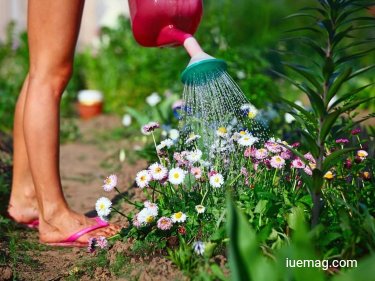

6 Ways to Take Care of Your Flowering Plants

Flowering plants need quality care to grow properly. Although they are different from each other, most of them are sensitive to various weather conditions and may wither and die easily if there is no proper care, especially when they are under harsh conditions. Therefore, if you love having flowers around your garden, and you want a successful outcome from them. You will have to do more than just weeding and watering of your flower garden. There are many other things that you need to consider that are part of taking care of your flowering plants. As you read on, you will find important care practices that you need to apply to your flowering plants.
1. Water regularly

When you have a small garden with pretty perennial and annual flowers. You must water regularly as part of caring for them. Especially in the summer season when plants lose a lot of water, and they can easily wither, you need to water at least once every day. Water twice a week during other seasons as they are not as hot. Also, it is vital to know the species of flowers that you have in your garden and their water needs. As those that love shade and those that thrive in full sun have various water needs. As part of the watering practice you give your plants, consider the amount of rainfall in your area and the type of soil in your garden. Remember to apply the right amount of water and apply directly to the soil instead of the foliage, among other safe watering methods.
2. Mulch your plants
If you live in places with water scarcity, practice mulching as a way to care for your plants. Mulching will help retain the soil moisture and allow your plants to grow well. Also, mulching is beneficial as it helps to control weeds and regulate the soil temperature. So, if you decide to use mulches in your flower garden, the ones you choose must not interfere with the beauty of your plants. Some of the mulches that you can choose are wood chips, leaves, polythene papers, and grass. Mulch your plants not only to maintain soil moisture and nutrients but also to give your flower garden a polished look.
3. Use clean tools
If you do not clean your garden tools after use, you can easily spread diseases to your flowering plants. For this reason, ensure that your pruning and weeding tools are always clean and disinfected where possible. This will ensure that they are free from any disease-causing micro-organisms. It is best to follow through with this practice before and after using your garden tools. Use chlorine bleach or isopropyl alcohol as they are good disinfectants that you can use to dip the tools in the chemical solution for a few minutes. Optionally, if this makes you use a lot of disinfectants, have some of the solutions always ready and wash your tools.
4. Plant where there is enough sunlight

Sunlight is essential in plants as it is their source of energy. Thus, your flowers must get enough of this sunlight. Although it depends on the needs of various flowers as discussed above. So you need to know how to position them depending on the variety. Like indoor plants require few hours of sunlight in comparison to those that are outside. Importantly, if you want to grow your flowering plants outside. It is best that where you establish your garden is away from large trees and tall buildings to avoid sunlight blockage. However, if your plants are already in full sun and cannot survive long hours of the exposure, position a barrier in your garden like vases to prevent direct sun during some hours of the day.
5. Apply proper fertilizers
After some time, garden soils lose their fertility and as a result, it subjects plants to inadequate nutrients. In case you realize that your garden has low soil fertility, it is best to apply appropriate fertilizers to your flowers as a way to care for how they grow. Use water-soluble fertilizers as they are the best for flowers, and you must follow the manufacturer’s directions to apply the fertilizer correctly. Consult on the benefits of using the fertilizer you have and how much will be enough for the flowers in your garden to ensure it is enough for your plants, as it is a way to care for your plants too.
6. Prevent and control pests and diseases

Pests and diseases easily kill flower plants. Due to this, you need to prevent them from attacking your garden. Prevent these pests by installing traps and barriers and keeping your garden off refuse and weeds. Bugs, aphids, mites, gnats, and whiteflies are some pests that affect your flowers. Plus, if your flowers are attacked by pests, you need to use suitable pesticides to kill the pests. Alternatively, remove the highly affected plants to control any further spread of the pests. While for the diseases, fungi, viruses, and bacteria are some that are harmful to flowers. To prevent them, avoid using too much water in your garden, especially for fungal diseases. As for the viral and bacterial diseases, use clean pruning and weeding tools. In case your plants get infected use the best, virucide, bactericide, and fungicide depending on the cause. In summary, the above are some of the care practices that you can try. What’s more, you can also thin and cull your plants when necessary. Plus, stake your flowers, especially those that require the support and also that need to grow in a certain direction. Another care practice that is common and will boost and prolong your flower blooms is deadheading your flowers.
Sometimes you have to replace the soil if it is not sustaining your flowers. These and many other care practices are important for flowering plants. So give them a try and see your flowers thrive as you maintain a beautiful flower garden.
Copyrights © 2025 Inspiration Unlimited - iU - Online Global Positivity Media
Any facts, figures or references stated here are made by the author & don't reflect the endorsement of iU at all times unless otherwise drafted by official staff at iU. A part [small/large] could be AI generated content at times and it's inevitable today. If you have a feedback particularly with regards to that, feel free to let us know. This article was first published here on 11th August 2020.
Overthinking? Uninspired? Brain Fogged?
Let's Reset That! Try iU's Positivity Chat NOW!

All chats are end-to-end encrypted by WhatsApp and won't be shared anywhere [won't be stored either].


